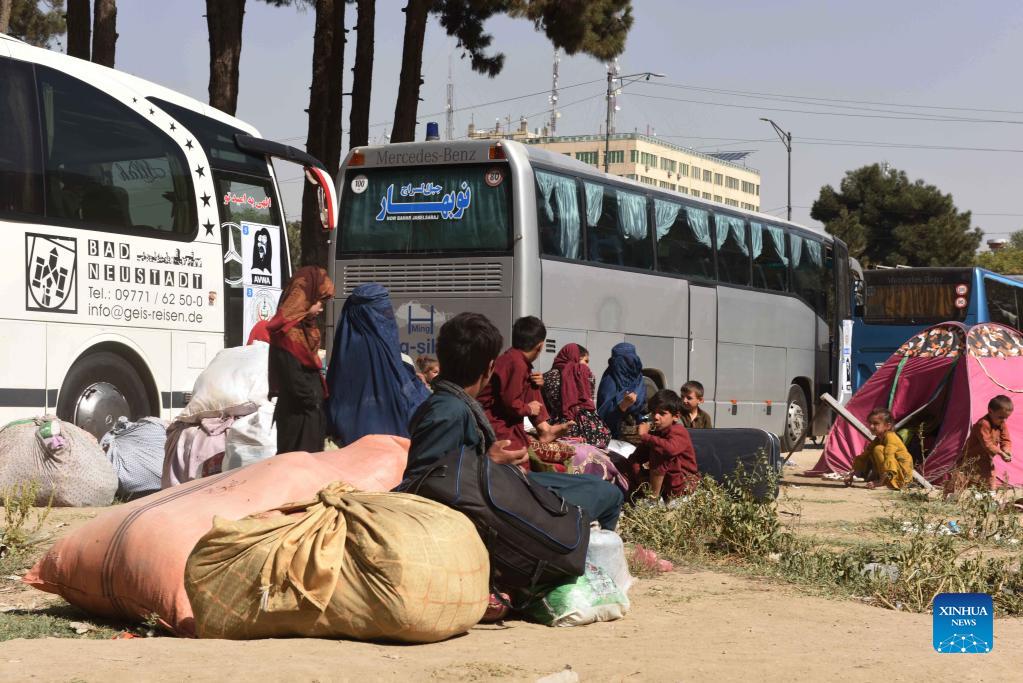
Displaced people wait to return home in Kabul, capital of Afghanistan, Oct. 4, 2021. Although the 20-year war in Afghanistan has ended, the pain has just begun for many displaced Afghans who are eager to return home with harsh challenges lying ahead. (Photo by Mohammad Jan Aria/Xinhua)
KABUL, Oct. 5 (Xinhua) -- Although the 20-year war in Afghanistan has ended, the pain has just begun for many displaced Afghans who are eager to return home with harsh challenges lying ahead.
"We were forcibly displaced by bloody fighting and clashes to get away from deaths. We escaped from a province famous for its wonderful sceneries and beautiful views and we lost homes and all belongings. How can we return now? We have no cash and we have no home appliances. We lost everything," Mirza Mohammad, a displaced man from the northern Takhar province, told Xinhua on Monday.
"We are struggling to return home after three months of living on an open ground in the Shahr-e-Naw Park, but we are facing harsh economic woes and severe challenges," he said.
"Our home is destroyed. We have no saving and cash to rebuild our home. If we are assisted to rebuild our house in Takhar, we will not stay in Kabul anymore," said Mohammad, the only breadwinner of his nine-member household.
The security situation remained generally calm across Afghanistan since Taliban's takeover in mid-August.
However, the Islamic State-affiliated militants have staged a spate of bomb attacks in the national capital Kabul and Jalalabad city, the capital of eastern Nangarhar province in recent weeks.
Mohammad said Taliban authorities have announced that "the war is over," but security was not enough, as the war and drought affected all Afghans while they need work and employment, financial support and permanent shelter as well.
Mohammad said displaced families are still in fear of possible fighting between Taliban members and anti-Taliban forces consisting of local fighters and security forces from the former government.
Mohammad, after his house was hit by mortar and destroyed in the northern Takhar province, fled war along with his family and experienced hard days facing food and clothing shortage for more than three months in Kabul.
In late September, the International Organization for Migration (IOM) said that it has started distribution of non-food items and emergency shelter kits to assist hundreds of internally displaced persons (IDPs) in a number of Afghan provinces.
Aminullah, a displaced man from Nejrab district of the eastern Kapisa province, said he received less from the aids. He said refugee affairs officials from the former administration repeatedly conducted survey in IDPs camps in Kabul, but some relief items disappeared before reaching the camps.
"If it was 1,000 afghani donations, we receive only 100 afghani of it. The remaining are distributed between those in the head," he said, pointing to the aid distributers who were cutting the aids for themselves.
The displaced families also include those Taliban bereaved families who were killed during the recent clashes and the war.
Binazir, the widow of a slain Taliban member in Takhar province, said she had fled war and drought along with 10 family members to Kabul to find shelter and food.
"My husband was a Taliban foot soldier who was killed during conflicts. I demand international organizations to help displaced people return to our province and rebuild our house," she said.
The Ministry of Refugee Affairs of the Taliban caretaker government, together with a number of aid agencies have started the relocation of thousands of internally displaced families, mostly from makeshift shelters in Kabul to their native provinces.
More than 1,000 IDP families have reportedly returned to their homes from the Kabul Shahr-e-Naw park under the cooperation between various aid agencies recently.
"The return is voluntarily. Each certain family returning to their province is given 10,000 afghani, about 110 U.S. dollars," Abdul Matin Rahimzai from Ministry of Refugee Affairs recently told local media.
"The Ministry of Refugee Affairs in collaboration with international aid agencies and UN organizations are working to support all IDPs to return from provincial capitals to their villages and home, as the security is fine and there are no clashes or fighting in rural areas across Afghanistan," he said.
Since the start of the year, over 634,000 people have been forcibly displaced by conflict. About 5.5 million people have been displaced since 2012, according to official figures.
On Sunday, in the northern Badakhshan province, about 600 displaced Afghans returned to their villages from an Afghanistan-Tajikistan border area, according to provincial Governor Maulvi Amanuddin Mansoor.
The returnees had been displaced during clashes prior to the Taliban's takeover in mid-August, Mansoor told reporters.
"They were living in a dire situation on an open ground. They returned after provincial officials ensured their security," he said.
Efforts are underway to help all displaced people return to their villages at an early date in the mountainous region as winter is approaching, the governor said.
According to United Nations officials, the UN would assist the Taliban administration on paving the way for international aid delivery and upholding the rights of Afghan women and girls at the time as basic services are lacking and food and other life-saving aid is about to run out. Enditem